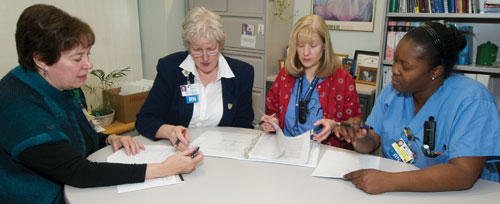New nursing clinical ladder tiers recognize, reward excellence


Two new tiers on Nursing’s clinical ladder at Christiana Care offer the health system’s almost 3,000 registered nurses greater opportunity for professional advancement, while ensuring an even safer clinical environment for patients.
On Dec. 11, the ladder expanded to four tiers from two, adding rungs for Level I novice/advanced beginner RNs, as well as a Level IV for expert RNs and empowering nurses to chart their own career advancement paths. For RNs wishing to pursue graduate degrees, certification or clinical specialty and yet remain at the bedside, the new Levels III and IV offer greater opportunity for recognition and compensation without needing to leave direct patient care for other positions.
“Until now, the only option for recognition or promotion was to move into administration, research or educational positions,” explains Dot Fowler, MSN, RN, BC, APN, administrative adviser for Nursing’s Professional Advancement Council. By offering Career Advancement of RN Excellence through Synergy (CARES), we now have the transformative opportunity to further develop and reward nurses who elect to apply their advanced knowledge and experience at the bedside.”
The Christiana Care Nursing Care Delivery Model is based on the American Association of Critical Care Nurses Synergy Model, which recognizes experience and the unique relationship between nurses and patients. Research reveals that each additional year of nursing experience on a clinical unit corresponds to five fewer patient deaths.
The extended ladder is the result of years of planning by more than 150 direct-care nurses representing their colleagues on the Professional Advancement Council (formerly the RNII Council), explains former council chair Crystal Pollock, RNII, C.
Dannette Mitchell, BSN, RN, CCRN, one of the longest-serving Professional Advancement Council representatives, explains that the expansion of Nursing’s clinical ladder validates the work of the nurse at the bedside, rewarding years of experience, knowledge and clinical expertise. “It offers those of us who love our work at the bedside to remain where our professional passion is, while giving us something to strive for,” Mitchell said. She said that the involvement of nurses on the council was integral to the successful launch of the expanded ladder. “We are the nurses at the bedside— on the front lines—representing our fellow workers, the nurses this ladder will affect.”
Marsha Babb, MS, BSN, RN, CNOR, who currently chairs Professional Advancement Council and was among the first Christiana Care nurses to apply for the RNII position back in 2002, describes the new ladder as “a transformational change in nursing.” Her motivation for more than six years on the council to help bring the expansion to fruition is fundamental as she speaks on behalf of her nursing colleagues. “We are worth it.”
Expanded clinical ladder
Level I is a six-month first step on the ladder for all newly hired RNs with less than six months experience. Its focus is on training, mentoring and nursing excellence.
Nurses at Level I soon advance to Level II/Competent RN, where they may choose to remain or to continue their climb to higher levels.
Level III marks proficiency and is most closely aligned to what has been the RNII designation to date.
Level III/Proficient RNs must have: at least five years of professional nursing experience, with two of those years in the current clinical specialty; a BSN or active enrollment in a BSN program; professional certification; and other qualifications.
In addition to the Level III requirements, Level IV/Expert RNs (available this spring), must either hold an MSN or be actively enrolled in a master’s program. These nurses must also chair or lead a shared decision making council or task force or demonstrate other system-based leadership experience.
Level IV RNs also hold leadership positions on local or national professional organizations and in community-based volunteer capacities.